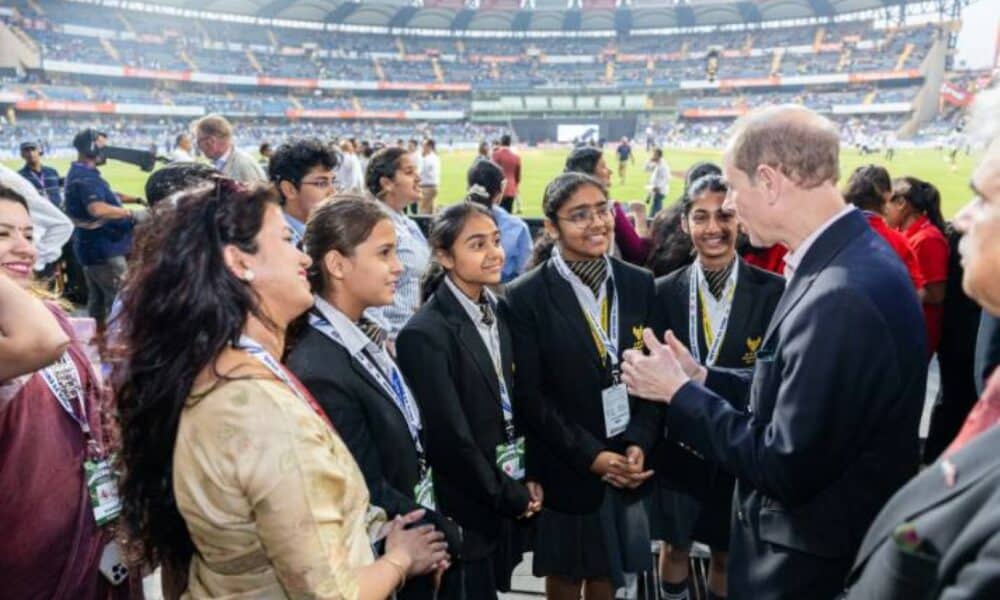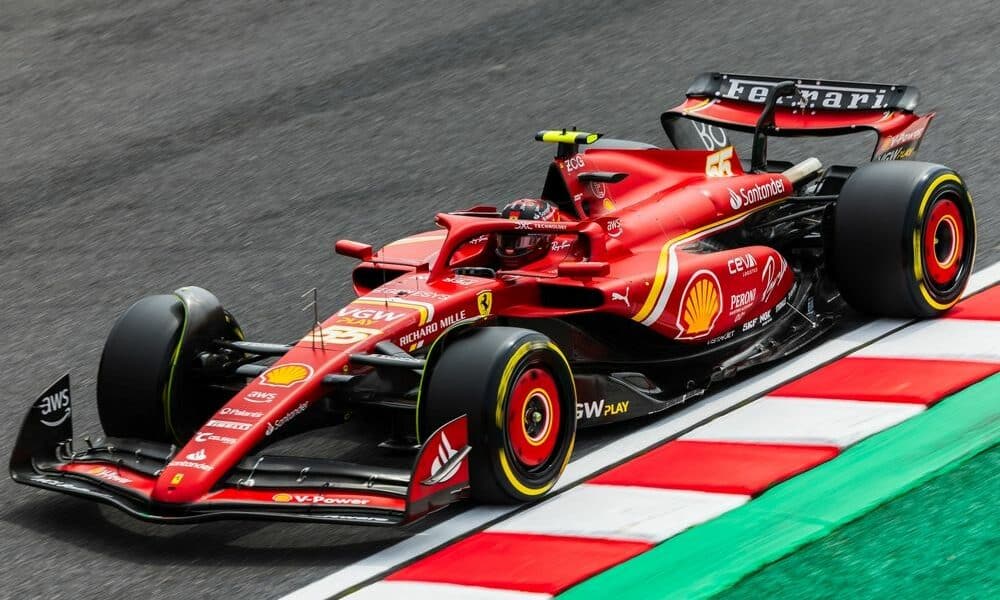Prince Edward strengthens UK-India relations with visit focused on youth education
The Duke of Edinburgh, Prince Edward, made an official visit to India from February 2 to February 4, 2025, to strengthen ties between the United Kingdom and India and promote The Duke of Edinburgh’s International Award, known in India as The International Award for Young People (IAYP). Founded by Prince Philip in 1956, the program aims to support young people aged 14 to 24 in developing essential life skills, gaining practical experience, and finding their purpose through non-formal education. Since its introduction to India in 1962, IAYP has impacted over 150,000 students from 325 educational institutions, making it one of the country’s leading youth development programs.
During his stay in Mumbai and New Delhi, the Duke participated in various youth-centered events, engaging with students, business leaders, educators, and philanthropists. He visited schools, met young participants of the program, and attended ceremonies emphasizing the collaboration between the UK and India in fostering education and nurturing young talents. His agenda included discussions on expanding the program to new institutions and evaluating its impact on youth empowerment initiatives.
The Duke of Edinburgh also attended cultural and sports events celebrating shared interests between India and the UK. He visited Raj Bhavan, the official residence of the Governor of Maharashtra, where he was welcomed by C.P. Radhakrishnan. The meeting focused on collaborative efforts to expand IAYP’s accessibility and enhance its benefits for young people in the country. Additionally, he participated in cultural activities highlighting the historical connection between the two nations.

The importance of The Duke of Edinburgh’s International Award in India
IAYP plays a crucial role in non-formal education by promoting experiential learning and developing practical life skills. The program is structured around four core sections that encourage young people to broaden their horizons and achieve independence:
- Service: Involvement in voluntary activities that contribute to communities and foster social responsibility.
- Skills: Encouragement to develop technical, artistic, and cultural skills.
- Physical recreation: Participation in sports and fitness activities to promote well-being.
- Adventurous journey: Challenging experiences such as expeditions and outdoor activities that build resilience and teamwork.
Currently, over half a million young people participate in the program in the UK, and around one million are engaged in the The Duke of Edinburgh’s International Award in more than 130 countries. India stands out as one of the nations where IAYP has the most significant impact, helping students from diverse socioeconomic backgrounds develop essential skills, increasing their career opportunities, and shaping their futures.
Prince Edward’s reception in India
The Duke of Edinburgh was warmly welcomed by educators, community leaders, and students benefiting from IAYP. At The British School in New Delhi, he interacted with students who shared their experiences with the program and the challenges they faced. The school’s principal, Vanita Uppal, expressed her appreciation for the Duke’s visit and highlighted how IAYP has transformed students’ lives by offering practical learning experiences and strengthening social-emotional skills.
Beyond visiting educational institutions, the Duke of Edinburgh attended networking events with business leaders and philanthropists supporting educational initiatives. These meetings were crucial for discussing new expansion strategies and securing funding to help even more Indian students benefit from IAYP.
Prince Edward’s role in the British Royal Family
Prince Edward, the youngest son of Queen Elizabeth II and Prince Philip, was granted the title of Duke of Edinburgh in 2023 after his brother King Charles III ascended the throne. At 59 years old, Edward is 15th in line to the British throne and has been actively involved in social and educational causes.
Unlike other royal family members who pursued military careers, Edward initially worked in theater and television production before dedicating himself to royal duties. His involvement with The Duke of Edinburgh’s International Award began in 1988, and since then, he has traveled worldwide to promote the initiative, ensuring the continuation of his father’s legacy.
The impact of the program on Indian youth
IAYP is widely recognized for preparing young people for the future by fostering independence and self-confidence. Many students who have completed the program in India emphasize how IAYP has helped them improve interpersonal and professional skills. The benefits include:
- Leadership development and problem-solving skills.
- Increased engagement in community service and volunteer work.
- Better preparation for job opportunities and university admissions.
- Enhanced resilience and adaptability in different life situations.
The program’s implementation in India is supported by schools, universities, and non-profit organizations that promote inclusive education. The Duke of Edinburgh’s visit reinforces the importance of international collaboration to ensure more young people have access to the opportunities provided by IAYP.
History of The Duke of Edinburgh’s Award and its global expansion
Founded by Prince Philip in 1956, the program aimed to prepare young people for adulthood by encouraging practical learning and skill development. Initially designed for British teenagers, the award quickly expanded to other countries, becoming one of the most respected youth development initiatives worldwide.
Today, The Duke of Edinburgh’s International Award operates in over 130 countries, impacting millions of young people. Its growth is driven by recognition from educational institutions and companies that view the program as an effective way to nurture talent and promote youth empowerment.
The future of the program in India and new projects
The Duke of Edinburgh’s visit paves the way for new initiatives to expand IAYP’s reach in the country. Discussions include:
- Expansion to public schools and underprivileged communities: Ensuring students from all socioeconomic backgrounds can access the program.
- Partnerships with businesses and universities: Increasing internship and professional development opportunities for IAYP participants.
- Integration with government programs: Strengthening UK-India collaboration in the education sector.
The sustainability and continued success of IAYP rely on the involvement of various sectors in society. The Duke of Edinburgh’s visit highlights the need for ongoing investments in non-formal education and youth development.

The Duke of Edinburgh, Prince Edward, made an official visit to India from February 2 to February 4, 2025, to strengthen ties between the United Kingdom and India and promote The Duke of Edinburgh’s International Award, known in India as The International Award for Young People (IAYP). Founded by Prince Philip in 1956, the program aims to support young people aged 14 to 24 in developing essential life skills, gaining practical experience, and finding their purpose through non-formal education. Since its introduction to India in 1962, IAYP has impacted over 150,000 students from 325 educational institutions, making it one of the country’s leading youth development programs.
During his stay in Mumbai and New Delhi, the Duke participated in various youth-centered events, engaging with students, business leaders, educators, and philanthropists. He visited schools, met young participants of the program, and attended ceremonies emphasizing the collaboration between the UK and India in fostering education and nurturing young talents. His agenda included discussions on expanding the program to new institutions and evaluating its impact on youth empowerment initiatives.
The Duke of Edinburgh also attended cultural and sports events celebrating shared interests between India and the UK. He visited Raj Bhavan, the official residence of the Governor of Maharashtra, where he was welcomed by C.P. Radhakrishnan. The meeting focused on collaborative efforts to expand IAYP’s accessibility and enhance its benefits for young people in the country. Additionally, he participated in cultural activities highlighting the historical connection between the two nations.

The importance of The Duke of Edinburgh’s International Award in India
IAYP plays a crucial role in non-formal education by promoting experiential learning and developing practical life skills. The program is structured around four core sections that encourage young people to broaden their horizons and achieve independence:
- Service: Involvement in voluntary activities that contribute to communities and foster social responsibility.
- Skills: Encouragement to develop technical, artistic, and cultural skills.
- Physical recreation: Participation in sports and fitness activities to promote well-being.
- Adventurous journey: Challenging experiences such as expeditions and outdoor activities that build resilience and teamwork.
Currently, over half a million young people participate in the program in the UK, and around one million are engaged in the The Duke of Edinburgh’s International Award in more than 130 countries. India stands out as one of the nations where IAYP has the most significant impact, helping students from diverse socioeconomic backgrounds develop essential skills, increasing their career opportunities, and shaping their futures.
Prince Edward’s reception in India
The Duke of Edinburgh was warmly welcomed by educators, community leaders, and students benefiting from IAYP. At The British School in New Delhi, he interacted with students who shared their experiences with the program and the challenges they faced. The school’s principal, Vanita Uppal, expressed her appreciation for the Duke’s visit and highlighted how IAYP has transformed students’ lives by offering practical learning experiences and strengthening social-emotional skills.
Beyond visiting educational institutions, the Duke of Edinburgh attended networking events with business leaders and philanthropists supporting educational initiatives. These meetings were crucial for discussing new expansion strategies and securing funding to help even more Indian students benefit from IAYP.
Prince Edward’s role in the British Royal Family
Prince Edward, the youngest son of Queen Elizabeth II and Prince Philip, was granted the title of Duke of Edinburgh in 2023 after his brother King Charles III ascended the throne. At 59 years old, Edward is 15th in line to the British throne and has been actively involved in social and educational causes.
Unlike other royal family members who pursued military careers, Edward initially worked in theater and television production before dedicating himself to royal duties. His involvement with The Duke of Edinburgh’s International Award began in 1988, and since then, he has traveled worldwide to promote the initiative, ensuring the continuation of his father’s legacy.
The impact of the program on Indian youth
IAYP is widely recognized for preparing young people for the future by fostering independence and self-confidence. Many students who have completed the program in India emphasize how IAYP has helped them improve interpersonal and professional skills. The benefits include:
- Leadership development and problem-solving skills.
- Increased engagement in community service and volunteer work.
- Better preparation for job opportunities and university admissions.
- Enhanced resilience and adaptability in different life situations.
The program’s implementation in India is supported by schools, universities, and non-profit organizations that promote inclusive education. The Duke of Edinburgh’s visit reinforces the importance of international collaboration to ensure more young people have access to the opportunities provided by IAYP.
History of The Duke of Edinburgh’s Award and its global expansion
Founded by Prince Philip in 1956, the program aimed to prepare young people for adulthood by encouraging practical learning and skill development. Initially designed for British teenagers, the award quickly expanded to other countries, becoming one of the most respected youth development initiatives worldwide.
Today, The Duke of Edinburgh’s International Award operates in over 130 countries, impacting millions of young people. Its growth is driven by recognition from educational institutions and companies that view the program as an effective way to nurture talent and promote youth empowerment.
The future of the program in India and new projects
The Duke of Edinburgh’s visit paves the way for new initiatives to expand IAYP’s reach in the country. Discussions include:
- Expansion to public schools and underprivileged communities: Ensuring students from all socioeconomic backgrounds can access the program.
- Partnerships with businesses and universities: Increasing internship and professional development opportunities for IAYP participants.
- Integration with government programs: Strengthening UK-India collaboration in the education sector.
The sustainability and continued success of IAYP rely on the involvement of various sectors in society. The Duke of Edinburgh’s visit highlights the need for ongoing investments in non-formal education and youth development.











Post Comment